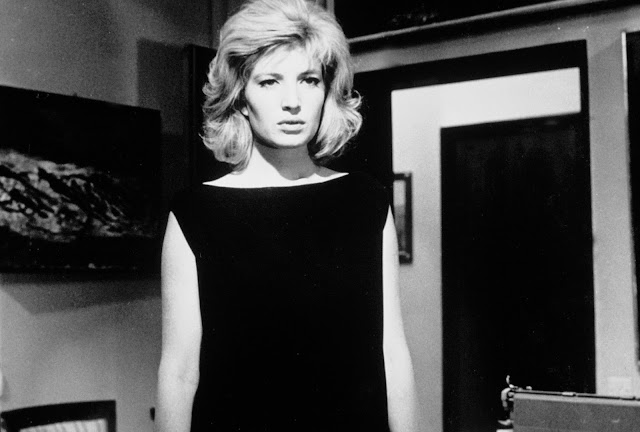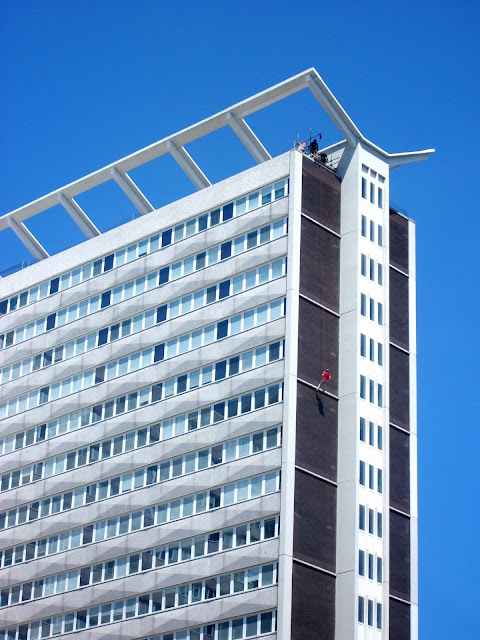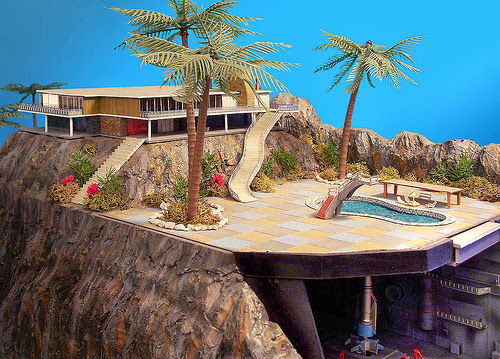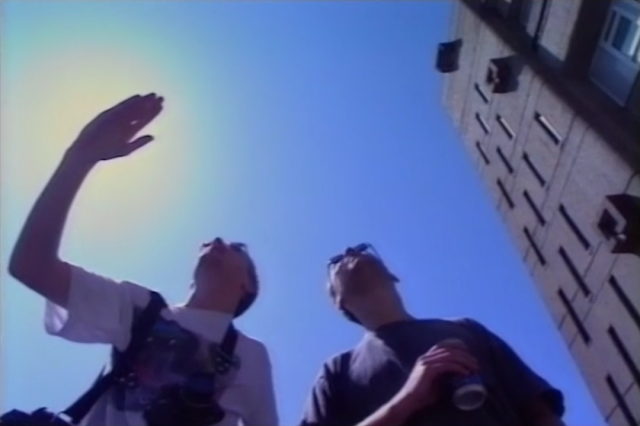Keeping up with L'Eclisse
A weird perk of having written Concretopia is that every so often I'll be asked to read or see something that might be of interest. So it was with this 1962 film, L'Eclisse, directed by Antonioni, which I'd never seen before, as is about to get a limited cinema release, followed by shiny new DVDs and Blu-Rays.
Now, I’ve never been to Rome. I’ve never even been to Italy. And the Rome I experienced in L’Eclisse is perhaps not the Rome I would recognise as a tourist, despite shots of some of the great ancient monuments of the city. Why? Well, firstly, if you've not seen it, much of this strange black and white film exists at the margins, in suburban apartments, on the edges of building sites, and quiet backstreets. Filmed by Michelangelo Antonioni at the start of the sixties, this is a city undergoing rapid transformation, by a nation in love with modernisation and the future. And in some ways this is what L’Eclisse is about. Not that I could really say what it is about, because it is such a suggestive, open, allusive (and elusive) movie. That’s why it’s so good.
Monica Vitti plays Vittoria, the central character in this strange roving tale, who drifts from one situation to the next, never fully committing (apart from one very surprising fancy dress sequence…). Alain Delon’s Piero is the handsome hollow man in hot pursuit, hanging round the street outside her modern apartment like an alley cat. Both are exceptional performances, small and intimate, deliberately lost in this grand project, eclipsed by Antonioni’s bigger vision, that of the people vanishing amid the material world they have created.
The city is being built all around them. The half-completed office and apartment blocks form a strangely blank backdrop to this empty romance. The cinematography, as one might expect in an Antonioni film, is astonishing throughout. Beauty and ugliness coexist and interrelate in every shot, the delight in still lifes and banal settings infuse the film with an almost zen-like calm and detachment. And the wind blows through this strange, bleak landscape as across high plans or mountain passes, often the only animating feature of a shot or a sequence.
I remember seeing Blow Up as a teenager and being baffled and alienated by it. Decades later L’Eclisse feels to me like an accurate portrait of the absurdity of modern life. Characters eclipse one-another, their forms fully or partially obscured; modernism eclipses classicism; greed eclipses decency. What I love most about it is that as a work of art it is bigger than I am, and left me feeling dwarfed by the ideas, the artistry and the poetry of it. And the ending is one of the most perfect in all of cinema, leaving the audience on the edge of their seats and never offering explanations or easy resolutions.
Why doesn’t cinema feel as daring and astonishing as this today? There is something so cold and alien about the performances, the shots, the settings and the story that is both unnerving and exciting. It does little to comfortably please, and everything to unsettle and provoke. For a fan of modernist architecture and design there is so much here, and it captures a moment of transition – of eclipse – with an instinctive logic all of its own.
L’Eclisse, Michelangelo Antonioni’s 1962 film, is re-released in cinemas on a fine new digital print by Studio Canal and ICO, from 28th August.
Now, I’ve never been to Rome. I’ve never even been to Italy. And the Rome I experienced in L’Eclisse is perhaps not the Rome I would recognise as a tourist, despite shots of some of the great ancient monuments of the city. Why? Well, firstly, if you've not seen it, much of this strange black and white film exists at the margins, in suburban apartments, on the edges of building sites, and quiet backstreets. Filmed by Michelangelo Antonioni at the start of the sixties, this is a city undergoing rapid transformation, by a nation in love with modernisation and the future. And in some ways this is what L’Eclisse is about. Not that I could really say what it is about, because it is such a suggestive, open, allusive (and elusive) movie. That’s why it’s so good.
Monica Vitti plays Vittoria, the central character in this strange roving tale, who drifts from one situation to the next, never fully committing (apart from one very surprising fancy dress sequence…). Alain Delon’s Piero is the handsome hollow man in hot pursuit, hanging round the street outside her modern apartment like an alley cat. Both are exceptional performances, small and intimate, deliberately lost in this grand project, eclipsed by Antonioni’s bigger vision, that of the people vanishing amid the material world they have created.
The city is being built all around them. The half-completed office and apartment blocks form a strangely blank backdrop to this empty romance. The cinematography, as one might expect in an Antonioni film, is astonishing throughout. Beauty and ugliness coexist and interrelate in every shot, the delight in still lifes and banal settings infuse the film with an almost zen-like calm and detachment. And the wind blows through this strange, bleak landscape as across high plans or mountain passes, often the only animating feature of a shot or a sequence.
I remember seeing Blow Up as a teenager and being baffled and alienated by it. Decades later L’Eclisse feels to me like an accurate portrait of the absurdity of modern life. Characters eclipse one-another, their forms fully or partially obscured; modernism eclipses classicism; greed eclipses decency. What I love most about it is that as a work of art it is bigger than I am, and left me feeling dwarfed by the ideas, the artistry and the poetry of it. And the ending is one of the most perfect in all of cinema, leaving the audience on the edge of their seats and never offering explanations or easy resolutions.
Why doesn’t cinema feel as daring and astonishing as this today? There is something so cold and alien about the performances, the shots, the settings and the story that is both unnerving and exciting. It does little to comfortably please, and everything to unsettle and provoke. For a fan of modernist architecture and design there is so much here, and it captures a moment of transition – of eclipse – with an instinctive logic all of its own.
L’Eclisse, Michelangelo Antonioni’s 1962 film, is re-released in cinemas on a fine new digital print by Studio Canal and ICO, from 28th August.













Really i appreciate the effort you made to share the knowledge.The topic here i found was really effective to the topic which i was researching for a long time
ReplyDelete